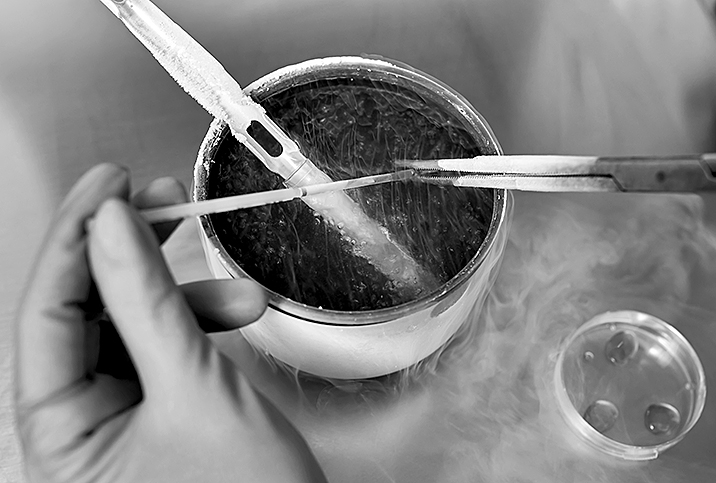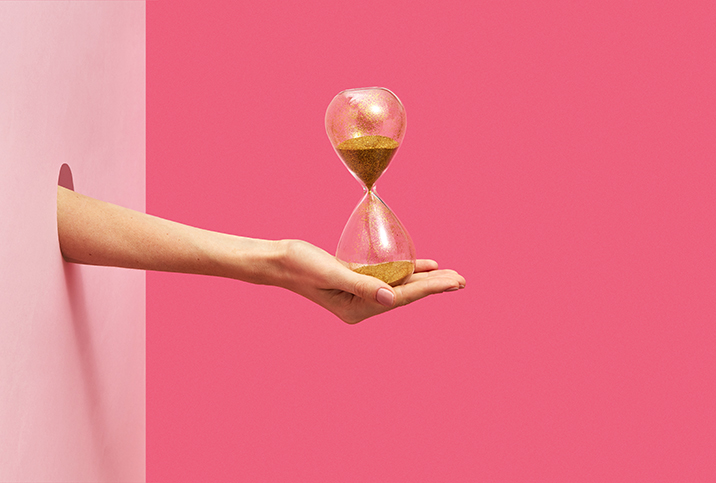Freezing Eggs and Embryos: Myths & Misconceptions

Freezing eggs and embryos is a great way for young women to increase their likelihood of having a family in the future if they're not ready to have one in the present.
To explain some basic terminology, each month during ovulation, a single mature egg is produced in either the left or right ovary. The egg is transported to the fallopian tube, where it can be fertilized by sperm and then becomes an embryo.
If you're debating whether or not you should freeze your eggs or embryos, you likely have a lot of questions. Here are some myths you should be aware of before you make a decision.
Myth: The procedure is too time-consuming.
Reality: The procedure takes about three weeks at the most. You'll first meet with a healthcare team that will ask questions about your fertility and goals for the future. You'll be prescribed hormone injections for nine to 11 days that cause your ovaries to release multiple eggs. As you're doing this, you'll have to undergo monitoring via ultrasound at your fertility clinic to see how you're developing.
Once you're ready, you'll visit the fertility clinic for a 20-minute procedure, during which the eggs are harvested and frozen.
Myth: It's better to freeze embryos than eggs.
Reality: Depending on your situation, either option is a good choice. If you don't have a partner in mind, but believe you'll have a partner in the future and would want your children to share half of your partner's genetic makeup, freezing eggs is the better idea. The only drawback is that eggs are more delicate than embryos, and you may want to freeze more eggs to make a healthy embryo once you're ready.
If you have a partner or sperm donor in mind for this process, it makes more sense to freeze embryos instead of eggs. For this procedure, your eggs will be fertilized in a lab, allowed to grow for about five days and then frozen. Embryos are made up of about 100 cells instead of an egg's single cell, meaning they're stronger and less likely to be lost during the thawing process.
In this exclusive interview with Giddy, 'Real Housewives of Orange County' alum Gretchen Rossi stresses the importance of prioritizing fertility—and freezing your eggs—in your 20s. Watch the full interview here.
Myth: Freezing eggs and embryos is dangerous.
Reality: The process of extracting eggs doesn't harm the woman or her potential baby, although it does require some determination on the woman's part. The woman must undergo several tests and hormonal injections, so it's recommended that you're serious about this procedure and understand exactly what this journey will entail.
Side effects while using the medication involved in this process are uncommon, but women may experience headaches, mood swings, insomnia, breast tenderness, hot and cold flashes, or ovarian hyperstimulation syndrome, the latter occurring in only less than 1 percent of young, healthy women who have this procedure.
The egg harvesting is done in the fertility clinic with healthcare professionals while the woman is lightly sedated to minimize pain.
Myth: Frozen eggs aren't as viable.
Reality: Frozen eggs are just as viable as "fresh" eggs and, in some cases, may even be better.
As women age, their eggs also become older and, therefore, less healthy and less numerous. Using an egg that you froze when you were younger may increase your likelihood of becoming pregnant. For instance, women in their 40s and 50s have less than a 5 percent chance of getting pregnant the traditional way and would have better luck getting pregnant using eggs they froze in their 20s and early 30s.
You may not be thinking about a family now, but if you're in your 20s and believe you might change your mind about having biological children, you could benefit from having your eggs frozen.
Planning to have a child in the future can be stressful when you don't know your options. Now that you have a better understanding of freezing eggs and embryos, you can make a more well-informed decision based on your present situation and your hopes for the future.

















